|
| NEWSLETTER IMPALA - Edition 05 - March 2022
|

|

|
Newsletter
|
|
Dear colleagues:
The main objective of the fifth edition of this newsletter is to share with you the progress this Project has had in its second phase for the latin american universities, the way they have been developed, and what the future will bring
It is important to remind you this newsletter has five sections, which will allow you to see firsthand what the project is about, how it has been developed, other important highlights, and all that will follow. Likewise, you can find additional information of interest related to this in the website impalaproject.eu
We hope you get in contact with us and follow closely this joint growth from the development of the IMPALA project
Marcela del Campo M.
Catholic University of Colombia
Coordinator of the IMPALA project
|
|
IMPALA AT THE SECOND LATIN AMERICAN MEETING OF SOCIAL MANAGEMENT
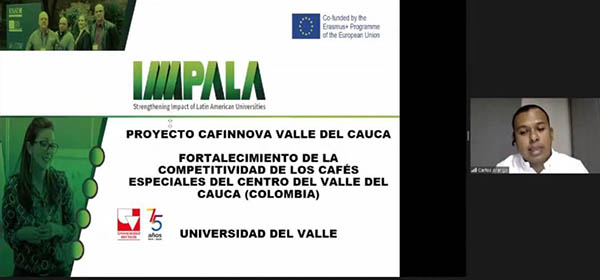
On 29 October 2021, the IMPALA project was presented at the second Latin American Social Management Meeting: "Social Management, Democracy, and Participation" organized by the Latin American Social Management Network – RELAGS. The meeting was attended by more than 400 people from 12 Latin American countries.
In this meeting, Carlos Alberto Arango-Pastrana and Juan David Peláez-León, both professors at Universidad del Valle (Colombia), were invited to participate in the fourth panel "Universities and Social Management: Teaching, Research, and Extension". The professors presented the IMPALA project to the panel attendees during their speeches. In addition, they exposed the measurement of impact in extension as a priority issue for universities, showing an application of the methodology IMPALA in the project "Strengthening the competitiveness of specialty coffees in the center of Valle del Cauca - CAFINNOVA". Funded by the Fondo General de Regalías in Colombia, this research project was adjusted from the methodology built by IMPALA to measure its impact. If you would like further information about this presentation, please go to the following link: https://www.youtube.com/watch?v=bVcUK55yli0 (13:20 min – 33:40 min).
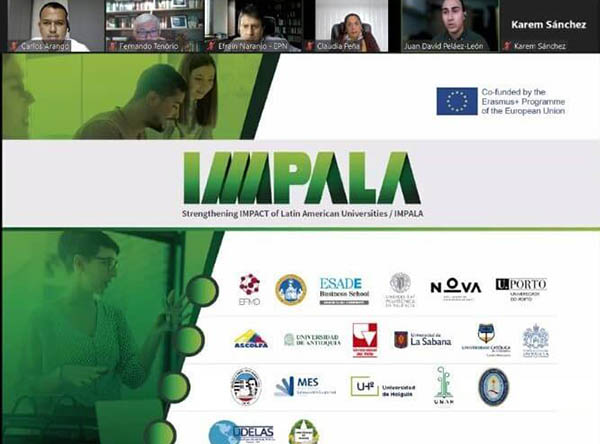
|
IMPALA Project presented to the boards of directors of the Agrarian University of Habana Fructuoso Rodríguez Pérez (UNAH)
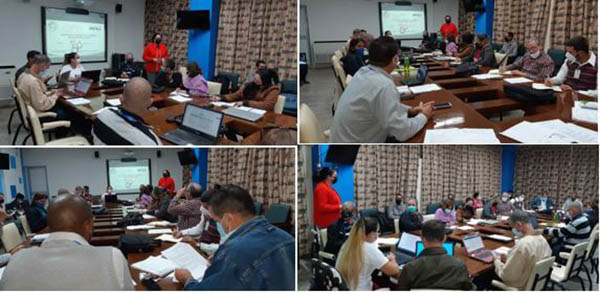
The boards of directors of the Agrarian University of Habana Fructuoso Rodríguez Pérez (UNAH), was presented with the framework and value chain generated from the project Fortalecimiento del Impacto de las Universidades Latinoamericanas IMPALA (Strengthening the Impact of Latin American Universities IMPALA).
Its usefulness was highlighted to measure the relevance of the University's actions with the environment and the importance of replicating this learning in the university community for the development of capacities in third mission actions. In addition, the Institutional Impact Assessment Report is presented with the projections of work from the application of the SWOT of the activities of the third mission. The directors of the UNAH highlighted the importance of the project for the improvement and the impact of the substantive university extension process in the Cuban university.
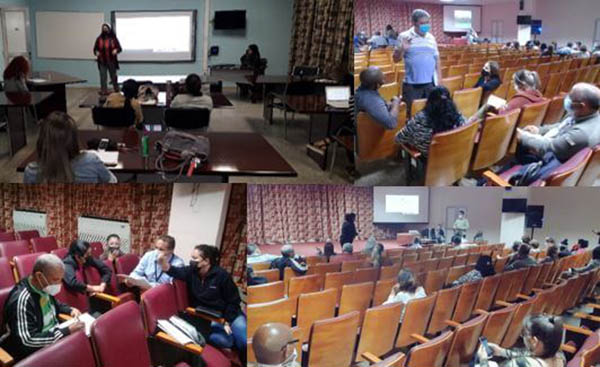
On January 22, 2022, an impact assessment workshop was held at the Agrarian University of Havana "Fructuoso Rodríguez Pérez", where the usefulness of the methodological tools generated in the project Fortalecimiento del Impacto de las Universidades Latinoamericanas IMPALA (Strengthening of the Impact of Latin American Universities IMPALA) were presented to directors, scientific leaders and university managers. Examples of good practices and lessons learned from the project were expounded, such as the application of the Impact Assessment Framework (IAF) to third-mission projects for each of the typologies determined in the IMPALA methodology. Among the presented examples, the project Inclusion of Students with Disabilities at the Agrarian University of Havana and the Doctoral Training College at the Scientific Teaching Complex of the Mayabeque Province stands out, which respond to the types of Assistance Services and Continuing Education, respectively, and is one of the the pilot projects that validates the IAF in the institution.
As part of the dissemination actions, replication workshops are held in each of the departments, areas of the University and Municipal University Centers of the province.
|
|
|
|
Firechat:Participation in impact evaluation: an essential approach.
- Facilitator: Dr. Pablo Rodriguez Bilella. Universidad Nacional de San Juan (AR)
- Date: 04/29/2022
- Time: 3:00pm
Regional Conference
- Date: May 10 - 12, 2022
- Venue: Panamá City, Panamá
Taller Mid-Term Project Clinic and Mentoring
- June 13-15, 2022
- Universidade do Porto, Portugal
Site Visit
- June 16-17, 2022
- Venue: Universidade do Porto, Portugal
|
|
|
IMPALA IN PRACTICE
|
IMPALA AS A BEST PRACTICE FOR INTERNATIONALISATION DURING THE CICT-UC
|
|
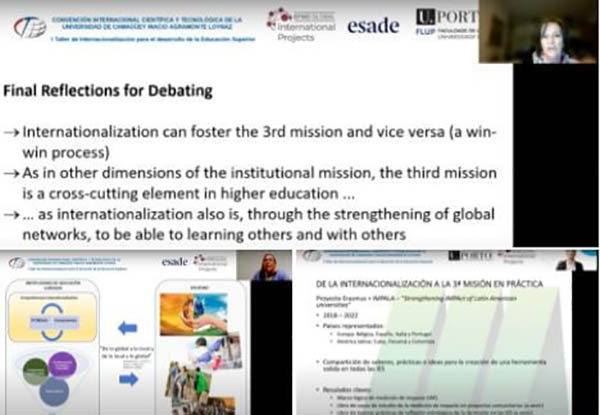
On 24 November, the project IMPALA was presented as a best practice for internationalisation of the 3rd mission in Latin America, as part of the International Scientific and Technological Convention of the University of Camagüey. The convention aimed at sharing best practices and information in a world of constant challenge, in line with the Sustainable Development Goals of the Agenda 2030 of the United Nations.
During the session, Ms. Marta BUSQUETS from Universitat Ramon Llull – ESADE, Dr. Madalena FONSECA from Universidade do Porto and Mr. Jean-Baptiste MAILLARD from EFMD presented the theoretical background of internationalisation, shared practical examples based on collaboration projects between the European Union and Latin America (among which, FORINT – Fortalecimiento de la Internacionalización entre las unviersidades europeas y latinoamericanas) and how internationalisation was present in the 3rd mission activities, as identified in the institutional reports of the IMPALA partners.
The Convention was the first occasion to present the conclusion of the institutional reports published as part of the work package 3, with the identification and analysis of the 3rd mission activities in each university. In the first quarter of 2022, partners will organise a round-table to exchange and reflect on the process. This will also pave the way for the publication of a best practice book, sharing the experience of the IMPALA partners and advice on how to engage in this process. The deliverable is expected for October 2022.
|
|
ONGOING
|
PILOT OF THE SECOND PROJECT BEINGS AT THE CATHOLIC UNIVERSITY OF COLOMBIA
|
|
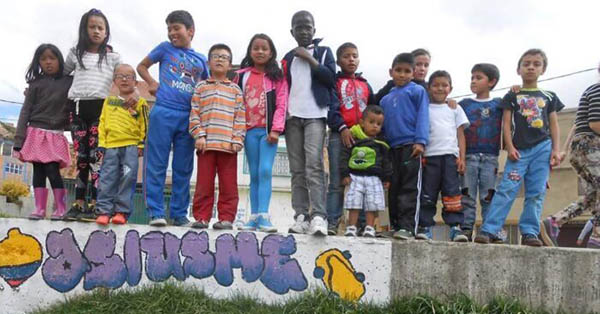
The Catholic University of Colombia has started the pilot of its second project, which is part of the typologies assistance services, cultural management and community actions. This project is called “Construction of Culture and environmental awareness with children and young people in some sectors of the 57 Zonal Planning Unit (UPZ by its acronym in Spanish) Gran Yomasa from 2016 to 2020”.
The main objective of the aforementioned project is to promote in girls, boys and young people the awareness of caring for the environment and responsible pet ownership as a contribution to the education processes to provide for the improvement of living conditions in the micro-territories involved.
To measure this objective, the following subprojects worked, among others, are taken into account:
- Reforestation of riverbanks for the conservation of the Bolonia stream associated with the Rincón de Bolonia community in the locality of Usme.
- Selection of structural alternative for the fog catcher project to use at the Ofelia Uribe de Acosta District School.
- Technical-social support for the development of sustainable energy projects at Ofelia Uribe de Acosta School – Yomasa, Bogotá D.C.
- Environmental waste management program for the community of the San Marcelino Champagnat Pastoral Service Center.
- Urban agriculture in Yomasa: “Sembrando Futuro”.
- Efficiency of wind energy in Yomasa “pilot test Ofelia Uribe de Acosta School”.
- Design of a wind turbine to generate electrical energy at the Ofelia Uribe de Acosta school, Yomasa community.
- Agrimation 1.0: automated agricultural prototype of sprouts at the San Marcelino Champagnat Center.
- Water Collector 1.0: development of a water collection system.
- AGRODROYD: monitoring system for the care and irrigation of agricultural products in urban crops.
- Manual for the monitoring and stability of the slope at Ofelia Uribe de School.
- Grooving of water supply for the greenhouse at the Ofelia Uribe de Acosta School.
- Strategies for the recovery of the round of the Yomasa stream.
- Home systems for collecting rainwater.
- Piping and management of fog catcher water, Ofelia Uribe de Acosta School, Usme locality.
- “Huellitas al Rescate” Project
These subprojects register approximately 80 activities carried out with the community and around 200 girls, boys and young people trained in caring for the environment.
Measuring the repercussion of this project will allow the university to know how much it has managed to transform this community.
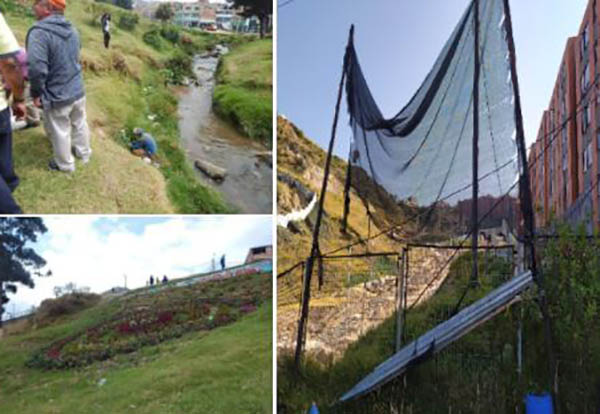
|
IMPALA work session observation in the Pontifical Xavierian University (Pontificia Universidad Javeriana) and the University of La Sabana
|
|
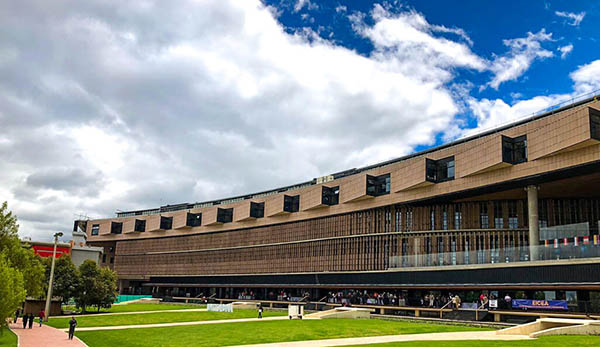
Following two years of virtual meetings and online work sessions of the IMPALA project as a result of the pandemic, the consortium finally returned to meet face-to-face from the 14th to 18th of March to carry out a study visit and a coordination meeting.
On this occasion, Colombia was the destination that was chosen to receive the delegations of the consortium with the Pontifical Xavierian University and the University of La Sabana as hosts of the event.
During these days, each of the host institutions organised work spaces with different participants of the third mission including, managers, beneficiaries and directors. They will shared the projects of the different typologies of the third mission that are being conducted in their institutions with the members of the consortium.
Likewise, we made the most of this study visit by carrying out a round table with the participation of the Colombian Association of Universities (ASCUN for its acronym in Spanish), the National Council of Accreditation (CNA for its acronym in Spanish), and the Latin American Network of Accreditation, whose objective is to analyse, in more detail, the topics related to quality, accreditation processes and the third mission of the universities.
After two years of virtual meetings, it was also important to change the discussion methods and to rekindle communication between the partners of the consortium, hence the importance of this face-to-face meeting.
|
|
TO HIGHLIGHT
|
CUBAN UNIVERSITIES RECEIVE THE EQUIPMENT FROM THE PROJECT IMPALA
|
|
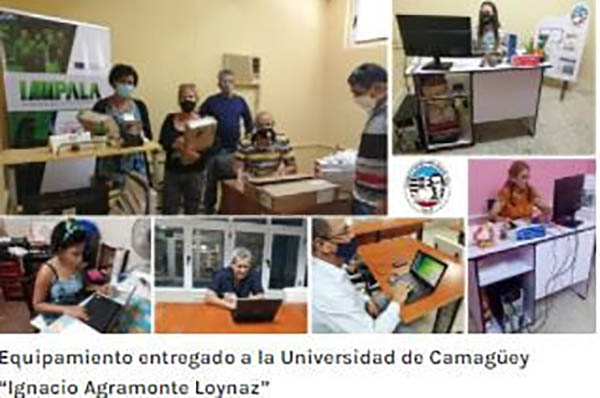
On 3 November 2021, the Cuban universities of the project IMPALA received the equipment which will allow them to this ERASMUS+ project’s objectives and ensure the sustainability of its results.
The equipment will support the work of the departments in the University of Camagüey in charge of the institution’s third mission directly connected to the project IMPALA, in particular, for the project’s coordination and management, as well as the third mission’s tipologies.
It has been already used for the III International Scientific Convention Universidad central “Marta Abreu” de Las Villas, in online meetings related to the development of the Local University Centres, or for communicating with members of the university’s community.
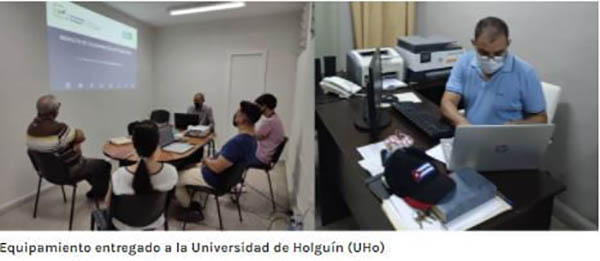
The University of Holguin (UHo) and the Agrarian University of Havana “Fructuoso Rodríguez Pérez” (UNAH) will seek to give continuity to the process of creating a new third mission activities’ impact evaluation framework, and continue the support to the various training activities of the IMPALA project.
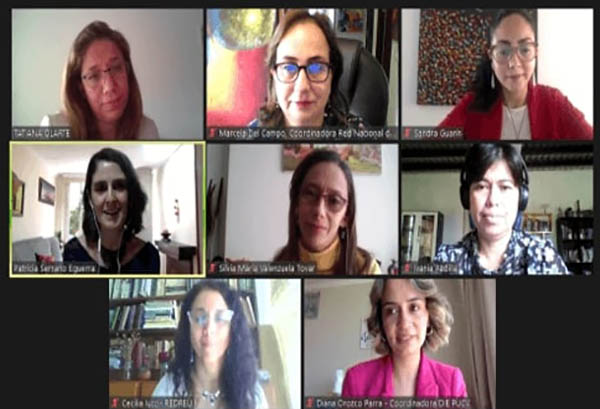
It is important to mention that all institutions received this IT equipment when activities and meetings had to be held online, due to the epidemiological situation caused COVID-19.
|
IMPALA project participates in important international events
|
|
In the month of October, the IMPALA project was presented at different international events. This is the case of the CAEI (Congress of the Americas on International Education), which was attended by 1,100 delegates and representatives of higher education institutions, associations, and national, regional, and international organizations, as well as government and private sector entities from 40 countries. In this event, Patricia Serrano and Marcela Del Campo presented the poster: “IMPALA: Alianza internacional para el fortalecimiento de la extensión universitaria” ("IMPALA: International Alliance for the Strengthening of University Extension".)
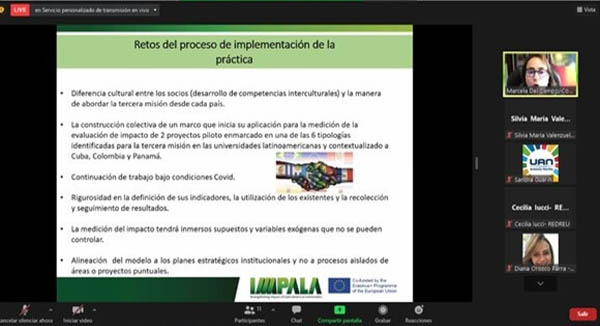
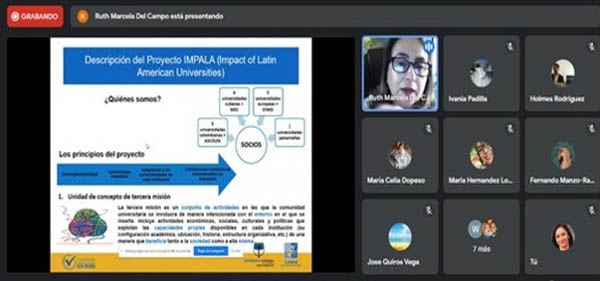
During the same month, Marcela Del Campo presented the paper. IMPALA: Modelo de evaluación de impacto de la extensión universitaria (Impact evaluation model of university extension) in the XVI international congress of the Latin American Extension Union. This event received more than 2,500 participants from Latin America and the Caribbean, meaning our project had high visibility. The aforementioned congress had, as its main objective, to contribute to the critical reflection of the work of Extension and Social Action of Latin American universities through the exchange of knowledge and experiences of different actors of the Latin American university and civil community regarding the challenges of the regional context.
It is in this way that the IMPALA project continues to gain visibility both nationally and internationally. In 2022, we will continue with the task of presenting the progress of the projects to all those interested in the third mission.
|
|
|

|

|
|
Catholic University of Colombia © all rights reserved 2018
To cancel your subscription, click here
This email was sent through MasterBase® ST for Catholic University of Colombia
Av. Caracas # 46 - 72 / Phone. 3 27 73 00
|
|
|
|